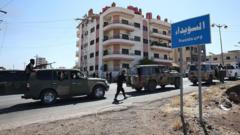Recent confrontations near Damascus reflect ongoing tensions and the precarious security environment in the region, raising alarms about potential broader conflicts.
Clashes in Syria's Druze Regions Threaten Fragile Stability

Clashes in Syria's Druze Regions Threaten Fragile Stability
Intensifying violence between Druze, Islamist factions, and security forces undermines hopes for peace in Syria.
Violence erupted once more in Syria’s Druze regions as clashes between Islamist armed factions, security forces, and members of the Druze minority escalated near Damascus, highlighting the ongoing instability that has persisted since the civil war began over a decade ago. The spiritual leader of the Druze community, Sheikh Hikmat al-Hijri, labeled this violence as an “unjustifiable genocidal campaign,” as security concerns grow amidst regional unrest.
Israel intervened with air strikes purportedly aimed at safeguarding Druze civilians, adding an international dimension to the conflict. This recent tension reveals a broader pattern of fragmentation across Syria, which remains politically divided and rife with armed factions despite attempts at establishing a semblance of order.
The new Syrian regime, claiming to restore unity, faces skepticism domestically and internationally due to its roots in extremist ideologies. Areas like Idlib, controlled by the Islamist group Hayat Tahrir al-Sham (HTS), and regions in the north-east, governed by Kurdish forces, exemplify the ongoing divisions. The Druze south of Damascus has experienced limited autonomy, complicating the already fractured political landscape.
Recent clashes in Ashrafiyat Sahnaya resulted in over 100 fatalities, with a significant number of casualties occurring among the Druze population, alongside armed faction members and security personnel. A ceasefire has reportedly been brokered between government forces and local Druze leaders following the violent outbreak, which erupted after an inflammatory audio recording circulated on social media, falsely linked to a Druze cleric.
The volatile mutual distrust among religious minorities, particularly the Alawites and Druze, is exacerbated by outside influences, particularly from Israel and Turkey. Israel has increased its territorial presence in southern Syria, viewing the new Syrian government’s ties with extremist factions as a direct threat. Meanwhile, Turkey’s backing of Syrian rebel forces adds another layer of complexity to the political dynamics.
While the Syrian government strives for stability and normalcy, the combination of internal strife and external pressures pose significant challenges, necessitating increased international support and a delicate balancing act involved in establishing peace in a nation still haunted by past upheaval.




















